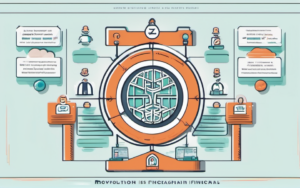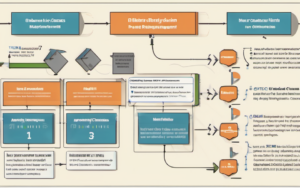Blockchain technology has emerged as a transformative force, promising a future where individuals control their data and participate in decentralized systems. The concept of blockchain decentralization has captivated imaginations, envisioning a world free from the shackles of centralized control. But as blockchain evolves, questions arise about its true potential. Will it truly lead to a decentralized utopia, or will it inadvertently pave the way for more centralized power? This exploration delves into the complexities of blockchain’s potential impact on governance and power structures.
The Promise of Decentralization
Blockchain’s decentralized nature has fueled hopes of a more equitable and transparent world. This technology, often associated with cryptocurrencies like Bitcoin, empowers individuals and institutions to operate independently of traditional intermediaries.
Empowering Individuals:
Blockchain enables individuals to take control of their data and assets. With decentralized ledgers, transactions are recorded immutably and transparently, reducing the need for trust in central authorities. This empowers individuals to participate in financial systems, manage their identity, and engage in secure data sharing without relying on intermediaries.
Transparency and Trust:
Decentralization promotes transparency and trust by eliminating single points of failure. Blockchain’s distributed nature means that data is replicated across multiple nodes, making it difficult for any single entity to manipulate or control the information. This transparency fosters trust and accountability, potentially leading to more robust and reliable systems.
Breaking Down Barriers:
Blockchain can break down geographical and financial barriers, allowing individuals and businesses to connect and collaborate more easily. Decentralized platforms facilitate cross-border transactions, micro-payments, and access to financial services, particularly in underserved communities. This potential for inclusion and empowerment is a key driver of blockchain’s appeal.
The Rise of Centralized Power
While the promise of decentralization is alluring, the reality is more nuanced. As blockchain technology matures, certain trends point towards the potential for centralized control, raising concerns about the true impact of this revolutionary technology.
Consolidation of Mining Power:
In the context of cryptocurrencies, the energy-intensive process of mining has led to the consolidation of power among a few large mining pools. This centralization raises concerns about control over network governance and the potential for manipulation of the blockchain.
Regulation and Governance:
As blockchain gains mainstream adoption, governments and regulatory bodies are increasingly stepping in to establish frameworks for governance. This regulatory oversight, while necessary for stability and security, may lead to centralized control and stifle innovation within the decentralized ecosystem.
The Role of Big Tech:
Major tech companies have invested heavily in blockchain technology, developing their own platforms and applications. This involvement raises concerns about the potential for these giants to exert undue influence over the blockchain ecosystem, creating a centralized landscape that undermines the spirit of decentralization.
Navigating the Middle Ground
The future of blockchain decentralization likely lies in a balanced approach, embracing both the benefits of decentralization and the need for responsible governance.
Hybrid Models:
Hybrid models, incorporating elements of both centralized and decentralized structures, may offer a more practical approach. These models can leverage the advantages of blockchain technology while mitigating risks associated with complete decentralization.
The Importance of Community:
A strong and active community is essential for maintaining a truly decentralized ecosystem. Communities can play a vital role in shaping governance, promoting transparency, and fostering innovation.
The Future of Decentralization:
The future of blockchain decentralization remains uncertain. The technology is still in its early stages, and its impact on governance and power structures will continue to evolve.
The path forward requires careful consideration of the potential for both decentralization and centralized control. By fostering open dialogue, promoting transparency, and prioritizing community involvement, the blockchain community can strive to realize the full potential of this transformative technology.




